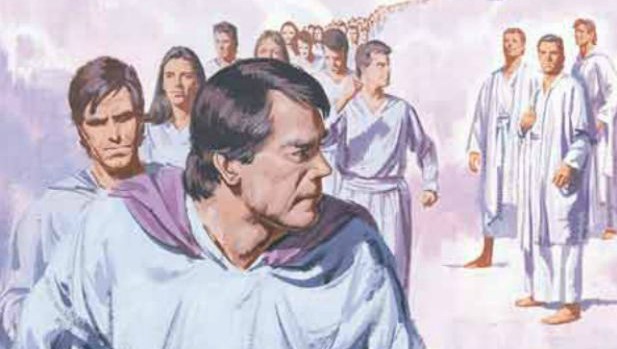Question
Gramps,
Those who die before the age of accountability make up a significant percentage of God’s children. They go straight to Heaven without the struggle, challenge or refinement of mortality. To me this seems to imply one the following.
A. Mortality is a remedial state for those who didn’t do as well in the pre-mortal existence or for those with a specific role to play.
B. Mortality really isn’t essential to God’s Plan. In which case, why are we here?
I hope that neither is true. Could you explain?
K S
Answer
K S,
Let’s first review the following knowledge we have with regards to children and the age of accountability:
The modern knowledge we have of children and the age of accountability has to be one of the most comforting doctrines restored in our latter days.
1) The age of accountability is the age at which children are considered to be responsible for their actions and capable of committing sin and repenting.
2) Satan cannot tempt little children, until they begin to become accountable before the Lord, D&C 29:46–47.
3) They are covered through the atonement of Jesus Christ, and thus the phrase they are alive in Christ
4) As a result of being alive in Christ, all children who die before the years of accountability are saved in the celestial kingdom, D&C 137:10.
This knowledge has brought so many people comfort knowing the Lord’s plan pertaining to our little ones who have passed through the veil without much experience in this life. Here are some words from Joseph F. Smith,
“It matters not whether these tabernacles mature in this world, or have to wait and mature in the world to come, according to the word of the Prophet Joseph Smith, the body will develop, either in time or in eternity, to the full stature of the spirit, and when the mother is deprived of the pleasure and joy of rearing her babe to manhood or to womanhood in this life, through the hand of death, that privilege will be renewed to her hereafter, and she will enjoy it to a fuller fruition than it would be possible for her to do here. When she does it there, it will be with the certain knowledge that the results will be without failure; whereas here, the results are unknown until after we have passed the test.”
Joseph Smith is quoted to have said the following with regards to little ones who passed beyond the veil before the age of accountability,
“We have again the warning voice sounded in our midst, which shows the uncertainty of human life; and in my leisure moments I have meditated upon the subject, and asked the question, why it is that infants, innocent children, are taken away from us, especially those that seem to be the most intelligent and interesting. The strongest reasons that present themselves to my mind are these: This world is a very wicked world; and it … grows more wicked and corrupt. … The Lord takes many away, even in infancy, that they may escape the envy of man, and the sorrows and evils of this present world; they were too pure, too lovely, to live on earth; therefore, if rightly considered, instead of mourning we have reason to rejoice as they are delivered from evil, and we shall soon have them again. …
“… The only difference between the old and young dying is, one lives longer in heaven and eternal light and glory than the other, and is freed a little sooner from this miserable, wicked world. Notwithstanding all this glory, we for a moment lose sight of it, and mourn the loss, but we do not mourn as those without hope.”
I ponder if this may be the reason behind your first two statements.
Let’s review the statements provided in relation to some questions:
The first statement specifies two different thoughts: 1) Our mortal experience is for those who didn’t perform well in our pre-existence, and 2) Or, you may have a specific role (which appears to imply it is the reason why we still are living and did not die before the age of accountability).
As to your first statement, which you feel is implied, I would bring your mind to the following words from President Russel M. Nelson when he addressed the youth of the Church, “My beloved younger brothers and sisters. You are among the best the Lord has ever sent to this world. You have the capacity to be smarter and wiser and have more impact on the world than any previous generation.” (emphasis added) I would think this substantially negates the first statement of those of us who live longer (beyond the age of accountability) didn’t do well in the pre-mortal existence.
I would think however, that this statement substantiates positively that all of us have a role to play who live beyond the age of accountability. Our role is to be an example of the believers in thought, word, and deed. We are to be our Savior’s ministers. We are responsible to minister to both the living and the dead (through temple ordinances and family history work).
The second statement and question are probably answered with regards to the purpose of this life, or God’s work and glory, “To bring to pass the immortality and eternal life” of his offspring. One of the principles restored that was lost through the apostasy is why we came here:
1) To obtain a physical body
2) To gain earthly experience, while we are tried and tested to see if we will do all things the Lord has commanded us.
One thing for sure, our lives may be difficult and we may find ourselves asking the same questions, or making a similar statement, “If life is to return to God, it would have been better that I died.” Job in the Bible asked this question, or made a similar statement of desiring death or not having been born; however, I would think that the moment we understand the true reality of this life I believe we will recognize how important this life was no matter how difficult it may have been. We will also recognize the experiences children who died before the age of accountability missed, but that we were fortunate enough to experience upon this earth.
Gramps







